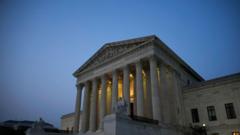During a lengthy hearing, Supreme Court justices faced tough questions about the scope of presidential power and past rulings on citizenship, as legal experts cast doubt on potential outcomes that could reshape the status of American citizenship.
Supreme Court Examines Trump's Push to Abolish Birthright Citizenship

Supreme Court Examines Trump's Push to Abolish Birthright Citizenship
In a landmark case, the U.S. Supreme Court debates the legality of President Trump’s executive order aimed at terminating birthright citizenship, with significant implications for immigration law.
The U.S. Supreme Court convened recently to hear arguments regarding President Trump’s controversial executive order aimed at eliminating birthright citizenship—a measure that could reshape immigration policy. The central issue lies in whether lower courts possess the authority to block such sweeping presidential actions, as has occurred in this instance. Solicitor General D. John Sauer defended the Trump administration’s position, asserting that lower courts have overstepped their boundaries. In contrast, New Jersey's solicitor general, Jeremy Feigenbaum, warned that granting Trump's request could create a disorganized patchwork of citizenship across states, causing chaos and uncertainty for millions.
The justices found themselves grappling with two pivotal topics: the power of lower courts to issue nationwide injunctions and the constitutionality of Trump's proposed changes to birthright citizenship, enshrined in the 14th Amendment. The ongoing legal battle is significant as Trump continues to seek avenues to fulfill his campaign promises without waiting for congressional action—if the Court sides with him, it could embolden his executive authority further.
Justice Elena Kagan questioned the administration's rationale for bringing the case, given previous losses in lower courts, while Justice Samuel Alito expressed skepticism about the power granted to lower courts to impose sweeping judicial injunctions. Advocates against the order underscored potential harms, emphasizing that altering birthright citizenship based on state boundaries represents an inherent contradiction to constitutional guarantees.
As the justices deliberated, demonstrators, including former Speaker Nancy Pelosi, rallied outside the court, voicing public dissent against Trump's immigration policies. Legal authorities have suggested that even a victory for Trump may not solidify his objectives, as the fundamental legality of denying birthright citizenship remains contested.
For now, the timeline for a ruling remains unclear, but should the Court favor the administration, the implications could drastically impact the lives of countless individuals born in the U.S., potentially reducing their status to that of "second-class citizens." Legal analysts caution about the broader repercussions of setting such precedent, which could even render many stateless or undocumented, jeopardizing their future within the nation.
The justices found themselves grappling with two pivotal topics: the power of lower courts to issue nationwide injunctions and the constitutionality of Trump's proposed changes to birthright citizenship, enshrined in the 14th Amendment. The ongoing legal battle is significant as Trump continues to seek avenues to fulfill his campaign promises without waiting for congressional action—if the Court sides with him, it could embolden his executive authority further.
Justice Elena Kagan questioned the administration's rationale for bringing the case, given previous losses in lower courts, while Justice Samuel Alito expressed skepticism about the power granted to lower courts to impose sweeping judicial injunctions. Advocates against the order underscored potential harms, emphasizing that altering birthright citizenship based on state boundaries represents an inherent contradiction to constitutional guarantees.
As the justices deliberated, demonstrators, including former Speaker Nancy Pelosi, rallied outside the court, voicing public dissent against Trump's immigration policies. Legal authorities have suggested that even a victory for Trump may not solidify his objectives, as the fundamental legality of denying birthright citizenship remains contested.
For now, the timeline for a ruling remains unclear, but should the Court favor the administration, the implications could drastically impact the lives of countless individuals born in the U.S., potentially reducing their status to that of "second-class citizens." Legal analysts caution about the broader repercussions of setting such precedent, which could even render many stateless or undocumented, jeopardizing their future within the nation.




















